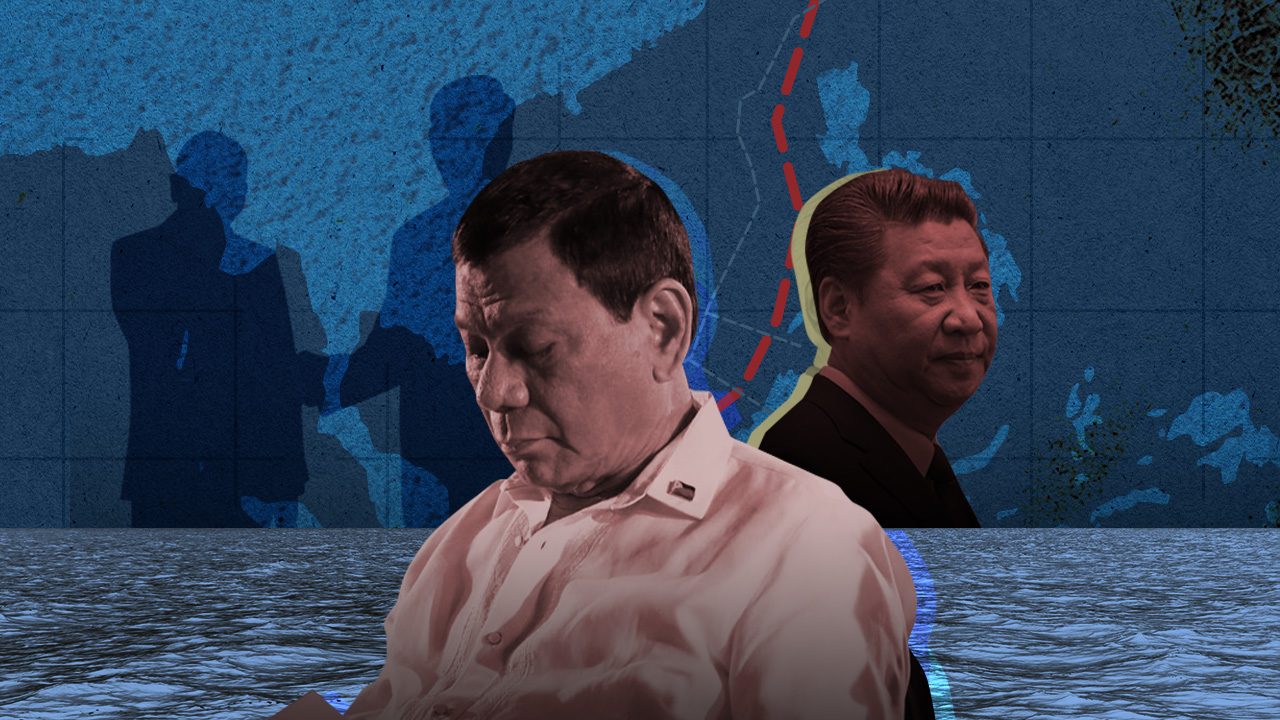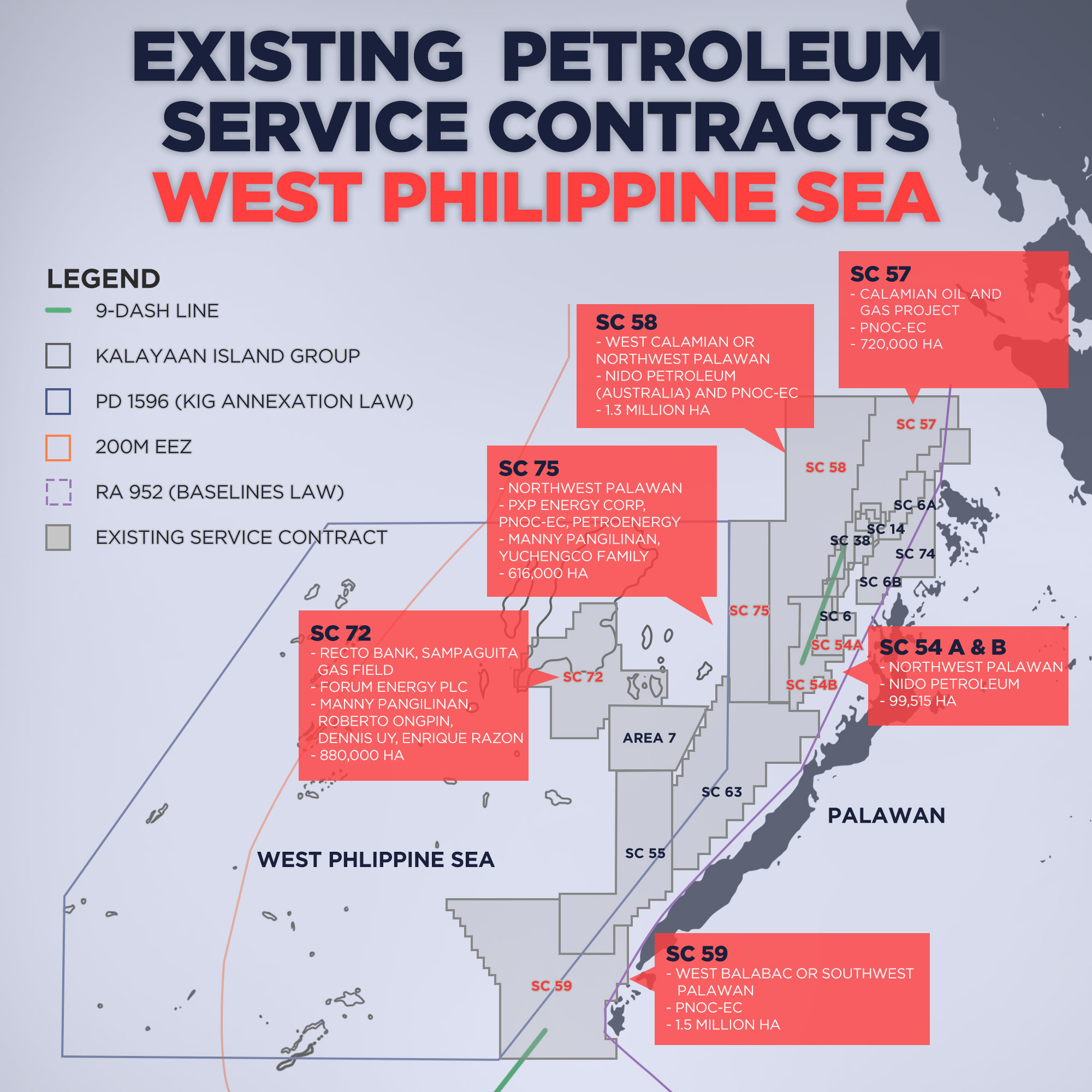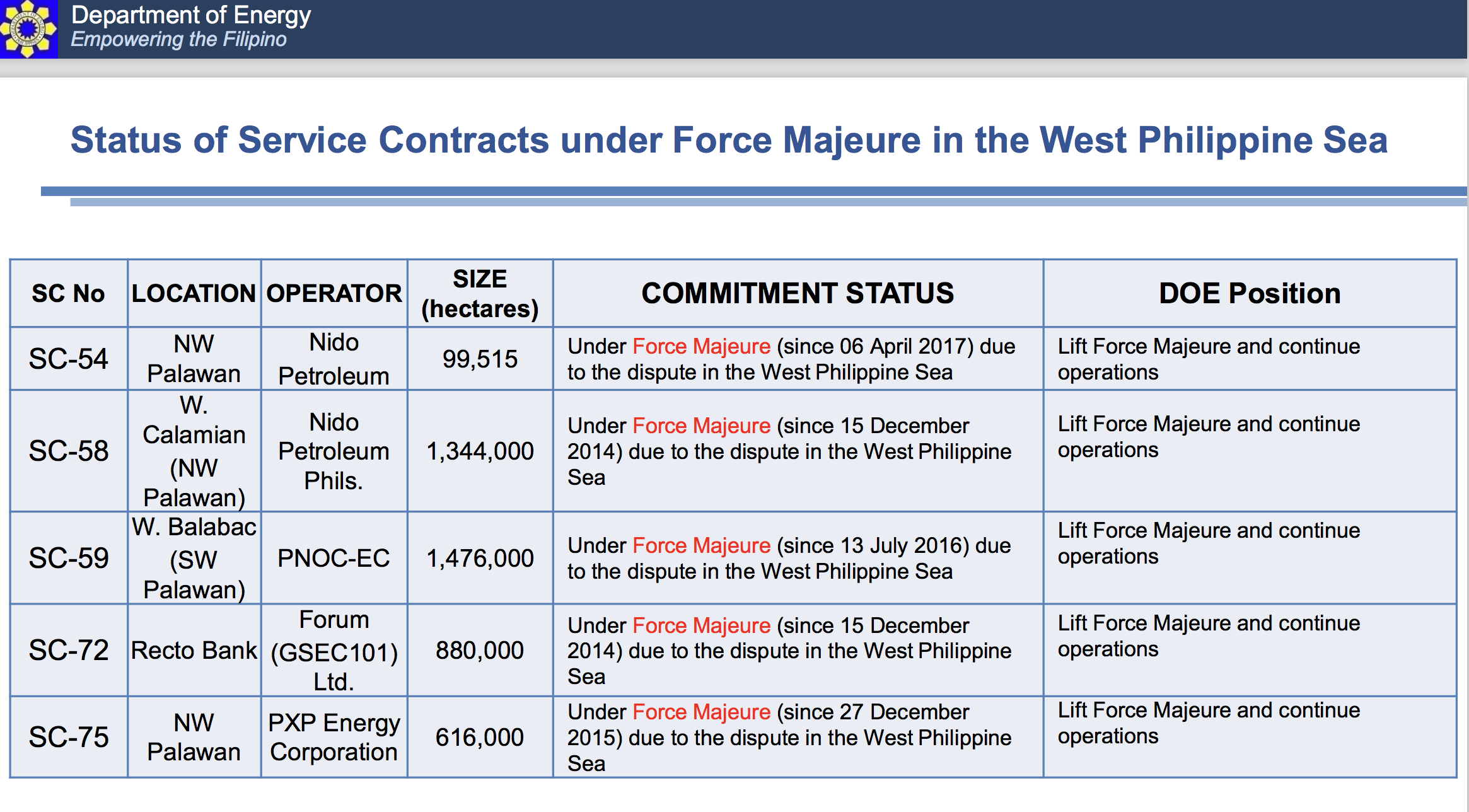SUMMARY
This is AI generated summarization, which may have errors. For context, always refer to the full article.

It’s been 9 years since Chinese ships scared off a Philippine-hired survey ship exploring oil-rich Recto Bank in the West Philippine Sea.
Three years after that March 2011 incident, the Philippine government declared a force majeure in Recto Bank and eventually in other parts of the West Philippine Sea – what we now call the moratorium on oil activities there.
This allowed companies to halt their activities and protect their investments from China harassment, but robbed the country of potentially vast amounts of oil and gas with which to fuel the economy.
Finally, on October 15, Philippine President Rodrigo Duterte opened a door that had been shut. He lifted the ban on oil exploration, forcing the same companies to resume their oil exploration activities at once.
But was it a Pandora’s Box he opened? Like the China in 2011, the China of 2020 still believes it owns the West Philippine Sea and the resources it holds. Will the 2011 incident happen again?
But one thing has changed from 9 years ago: China-friendly Duterte is now Philippine president.
“Because of the friendlier relations between President Duterte and the Chinese government, the likelihood of harassment of exploration and development activities by Chinese government vessels or their militia is nil,” former Navy vice commander and maritime security expert Rommel Jude Ong told Rappler.
Philippine officials were encouraged by China’s reaction to Duterte’s lifting of the ban, which Philippine Ambassador to China Chito Sta Romana described as “fairly positive.”
This is not that surprising since China itself may take part in the oil exploration activities. Indeed, the Chinese foreign ministry made sure to mention the memorandum of understanding on oil exploration and development cooperation signed under the Duterte administration.
“They said they look forward to cooperation between the two sides in line with the memorandum of understanding of 2018,” said Sta Romana on October 22.
Whereas it was an “outsider” in oil development activities greenlit by the Philippine government since the Aquino administration, today, Beijing has a foot in the door.
Diplomats involved in the landmark agreement said the lifting of the moratorium was a necessary next step to the MOU. Philippine Energy Secretary Alfonso Cusi said it could only be a positive development for China.
He is hopeful that the 2011 standoff with China won’t happen again, not when Beijing itself stands to benefit from the new chapter of oil development in the West Philippine Sea.
“If a Chinese company will be part of a joint venture arrangement in any exploration and development activities in the WPS, then all the more reason for China to cooperate rather than intervene,” said rear admiral Ong, who is now with the Ateneo School of Government.
Test of the China relationship
Is it too good to be true?
If things go as Cusi plans, China will only explore for, and extract, resources in the West Philippine Sea if it partners with a company that holds a license from the Philippine government.
But this means any oil the venture extracts belongs to the Philippines and the activity is governed by Philippine law. In other words, it would be an admission that the Philippines, not China, has primary economic rights in the body of water, a fact that Beijing has steadfastly tried to deny for decades. (READ: Carpio, Del Rosario say PH ‘safe’ with China oil deal)
Is Duterte’s strategy of meekness and friendliness with China finally paying off? Was he, in the end, correct in refraining from internationally asserting the 2016 Hague ruling, which, to China, is radioactive?
The resumption of exploration and development activities in the West Philippine Sea will test Duterte’s special relationship with China.
Will Chinese vessels keep their distance from survey ships? Will they let exploration and drilling activities go unhindered?
As recently as two months ago, Chinese surveillance ships were spotted in oil-rich Recto Bank (Reed Bank). The Philippine Navy wanted the foreign department to file a diplomatic protest with China over the incident.
Last May, a Chinese survey ship was involved in a tense month-long standoff with an oil exploration vessel contracted by Malaysian state oil firm Petronas. It took place in waters claimed by Malaysia, Vietnam, and China.
The Chinese ship only left the area when the Malaysian vessel finished its work, and it did so with an escort of two more Chinese ships.
“This would be the likely template if China decides to intervene in oil-related activities, say, in the Reed Bank,” said Ong.
What’s at stake
The South China Sea is estimated to hold 11 billion barrels of oil and 190 trillion cubic feet of natural gas in proved and probable reserves, according to United States Energy Information Administration (EIA). It’s not certain how much of these could be under the West Philippine Sea, the portion of the South China Sea that lies within the Philippines’ Exclusive Economic Zone.
But Recto Bank, an underwater reef formation said to contain most of the South China Sea’s oil and gas reserves, is within the West Philippine Sea.
It is said to hold 5.4 billion barrels of oil and 55.1 trillion cubic feet of natural gas, according to the EIA.
But with Duterte’s lifting of the moratorium, China can expect to see more Philippine ships in Recto Bank because one of the activities that can now resume is oil exploration and drilling by PXP Energy Corp, a Philippine firm led by tycoon Manny V Pangilinan.
PXP Energy is a unit of Forum Energy Plc, which holds Service Contract No 72, a license covering Recto Bank. It’s the same entity that had hired the survey ship chased by Chinese boats in 2011.
Other Filipino businessmen involved in Forum Energy are Enrique Razon (through Apex Mining), Roberto Ongpin (Atok Big-Wedge), and Duterte campaign donor Dennis Uy (Atok Big-Wedge).


SC 57 activities were halted because of an Arroyo-time executive order that barred PNOC-EC from awarding farm-in and farm-out deals for oil exploration and development. Duterte, through Executive Order No 80, took out this obstacle, allowing PNOC-EC to partner with Beijing’s China National Offshore Oil Corporation (CNOOC) in exploring the 720,000-hectare Calamian area covered by SC 57.
China keen on Recto Bank resources
The gas field in Recto Bank is called the Sampaguita gas field, already dubbed the “next Malampaya” because of its potential to replace the dwindling gas field. Three wells have already been drilled there and PXP Energy has said it plans to drill two more.
Once the moratorium is lifted, PXP Energy President Daniel Carlos had said the firm would conduct a 2,600-square-kilometer 3D seismic survey to look for areas likely holding oil reserves.
China is keen to get in the game. Over the past year, its oil development firm CNOOC has held meetings with Forum Energy executives. The talks are a result of the Duterte-time MOU on oil cooperation with China where Beijing had nominated CNOOC to be the firm that will partner with a Philippine firm holding service contracts in the West Philippine Sea.
The best-case scenario, and a win for Duterte, would be if China participates in West Philippine Sea oil exploration purely within the parameters of the Philippine service contract arrangement. Doing so would be an implicit acknowledgment that whatever oil is found and extracted belongs to the Philippines, which would allow Duterte to say the activity is in keeping with the country’s sovereign rights.
At the same time, there’s a saving face mechanism for China in the MOU itself. The document’s part IV states that all activities and agreements done in pursuit of the MOU “will be without prejudice to the respective legal positions of both governments.”
This allows Beijing to say it has not legally given up its stance that the West Philippine Sea falls within its 9-dash line.
Constant vigilance
Still, close observers like former Supreme Court senior associate justice Antonio Carpio and former foreign secretary Albert del Rosario urge caution and vigilance on the part of the Duterte government to make sure China sticks to the service contract and MOU terms.
Ong echoed these sentiments.
“We should be wary of the possibility that China will use any joint venture arrangement as a pretext for deploying Chinese government vessels, not to harass, but to ‘protect’ the survey operations. In such a case, their presence in our EEZ might be legitimized if one agrees to their proposition,” said the former navy official.
One way to guard against this is to involve the security sector in negotiations so they can spot any national security concerns that can be “addressed outright,” Ong suggested.
Philippine Energy Assistant Secretary Bodie Pulido said the department has already begun meeting with Department of National Defense and the Western Command of the Armed Forces of the Philippines to address the concerns of the service contractors about their safety and security.
Exploration is expensive. In total, the West Philippine Sea service contractors have committed to spend $79 million on the exploration and development activities, said Pulido, who supervises the Energy Resource Development Bureau.
“If someone were to interrupt their activities after they’ve already chartered one of these exploration vessels, which costs hundreds of thousands of dollars per day, just an interruption would be financially painful and could potentially make their exploration unviable,” he said.
If Duterte has indeed found the winning “formula” to the South China Sea dispute, the service contractors have nothing to fear from China.
Perhaps his deal with China is a step towards fulfilling what Asia’s Cauldron author Robert Kaplan says is “the more realistic hope of just managing the status quo to the benefit of all, so that all can pursue oil and natural gas exploration in the face of absolute rises in population” and energy prices that challenge all South China Sea claimants.
The coming months could prove Duterte right, or disastrously wrong. – Rappler.com
Add a comment
How does this make you feel?


![[The Slingshot] Alden Delvo’s birthday](https://www.rappler.com/tachyon/2024/04/tl-alden-delvo-birthday.jpg?resize=257%2C257&crop=263px%2C0px%2C720px%2C720px)
![[EDITORIAL] Ang low-intensity warfare ni Marcos kung saan attack dog na ang First Lady](https://www.rappler.com/tachyon/2024/04/animated-liza-marcos-sara-duterte-feud-carousel.jpg?resize=257%2C257&crop=294px%2C0px%2C720px%2C720px)
![[Newsstand] Duterte vs Marcos: A rift impossible to bridge, a wound impossible to heal](https://www.rappler.com/tachyon/2024/04/duterte-marcos-rift-apr-20-2024.jpg?resize=257%2C257&crop=278px%2C0px%2C720px%2C720px)

There are no comments yet. Add your comment to start the conversation.